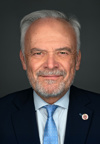QUESTION PERIOD — Ministry of Immigration, Refugees and Citizenship
International Students Overcoming War
June 14, 2022
Thank you, minister, for joining us today.
I want to ask you about an initiative undertaken by students at Wilfrid Laurier University, one of my alma maters. It’s called the International Students Overcoming War initiative. They have added, through a referendum, an $8 levy to their tuition fees so they can fund the placement of students from war-torn countries and regions at the university. There are some who are graduating. They have also come to Ottawa and met with your parliamentary secretary, I believe, and I think with your staff.
So far, 23 students have gone through this program. They have been very successful. Whether they go on to the permanent residency path or return to their countries and make contributions, it has been a success.
Is there something the government can learn from this particular initiative, which is privately done but at the initiative of our young leaders?
Thank you for the inspiring question. Congratulations to all the students involved.
It reminds me of when I was an undergraduate student signing up in my first year to volunteer for the World University Service of Canada, or WUSC, an organization that seeks to bring refugees to Canada for the purpose of studying.
Are there lessons we can learn? Yes, absolutely. No one has a monopoly on good ideas, the government included. To the extent that we can understand how to support some of the world’s most vulnerable who also form part of the cohort of international students who make some of the greatest social and economic contributions to our communities, I think we can continue to do this.
One of the things I’m reluctant to do, though, is to find a good idea and have the government take it over. When it comes to refugee resettlement, private resettlement in Canada is actually the envy of many countries around the world when I engage with them on a bilateral basis. When people have a built-in network of supporters who have put energy, time and, sometimes, funds into welcoming people into their communities, it actually results in them being supported well after they arrive.
To the extent that the students at one of your alma maters want to see what we can do to help spread this kind of generosity, please note this is right up my alley. Supporting some of the world’s most vulnerable and leveraging our education system to do it seems like a positive initiative to me, and I want to reiterate my congratulations for this innovation. The positive social development space is deeply encouraging.

